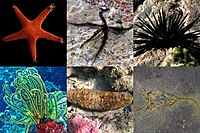
Photo from wikipedia
Excessive concentrations of arsenic in aquifers have been presented for the first time in the southern Brazilian coastal plain. In this region, the shallow aquifers are mainly constituted by a… Click to show full abstract
Excessive concentrations of arsenic in aquifers have been presented for the first time in the southern Brazilian coastal plain. In this region, the shallow aquifers are mainly constituted by a mosaic distribution of marsh sediment lenses formed in the interdune depressions in past times and subsequently covered by eolian sands. The stratigraphic descriptions and analytical determinations in water (pH, conductivity, As) and sediment (organic carbon, As, Fe, Mn) were obtained in samples of an interdune freshwater marsh, an aquifer (a palaeo-freshwater marsh), and a modern eolic dune. Principal component analysis was applied to summarize the process of As immobilization. In sediments of the modern interdune marshes and under suboxic conditions, As is mobilized from the eolic sands and its redistribution occurs along sediment profile. Its maximum concentration (up to 1.7 mg kg−1 dw) occurred at the marsh’s sediments surface and was strongly coupled to Fe hydroxides. In pore water of marshes, As has been registered up to 79 µg L−1. This enrichment was driven by reductive dissolution of As-bearing Fe hydroxides in sediments, where the reduced environment has allowed their desorption from solids as Fe(II) and As(III) reduction. After the cover of the interdune marshes by eolic sands, turning them into current aquifers, the high As contents have been maintained above the sanitary limit of 10 μg L−1 for drinking water in groundwaters. The southern Brazilian coastal plain is probably an area with arsenic contamination problem for groundwater, which deserves more attention when it is used for drinking supply.
Journal Title: Environmental Earth Sciences
Year Published: 2019
Link to full text (if available)
Share on Social Media: Sign Up to like & get
recommendations!